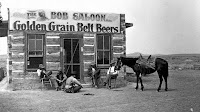El gato se había posicionado en la punta del poste. Haría
falta alguien fuerte y delgado, a la vez, para bajarlo de allí. Alexandra pensó
en Carl… Del clásico de Willa Cather: O
Pioneer! Al final: saloon, comforter, brooding, pallor
“Oh, Emil! Didn’t I tell you she’d get us into
trouble of some kind, if you brought her? What made you tease me so? But there,
I ought to have known better myself.” She went to the foot of the pole and held
out her arms, crying, “Kitty, kitty, kitty,” but the kitten only mewed and
faintly waved its tail. Alexandra turned away decidedly. “No, she won’t come
down. Somebody will have to go up after her. I saw the Linstrums’ wagon in
town. I’ll go and see if I can find Carl. Maybe he can do something. Only you
must stop crying, or I won’t go a step. Where’s your comforter? Did you leave it in the store? Never mind. Hold still,
till I put this on you.”
She unwound the brown veil from her
head and tied it about his throat. A shabby little traveling man, who was just
then coming out of the store on his way to the saloon, stopped and gazed stupidly at the shining mass of hair she
bared when she took off her veil; two thick braids, pinned about her head in
the German way, with a fringe of reddish-yellow curls blowing out from under
her cap. He took his cigar out of his mouth and held the wet end between the
fingers of his woolen glove. “My God, girl, what a head of hair!” he exclaimed,
quite innocently and foolishly. She stabbed him with a glance of Amazonian
fierceness and drew in her lower lip—most unnecessary severity. It gave the
little clothing drummer such a start that he actually let his cigar fall to the
sidewalk and went off weakly in the teeth of the wind to the saloon. His hand
was still unsteady when he took his glass from the bartender. His feeble
flirtatious instincts had been crushed before, but never so mercilessly. He
felt cheap and ill-used, as if someone had taken advantage of him. When a
drummer had been knocking about in little drab towns and crawling across the
wintry country in dirty smoking-cars, was he to be blamed if, when he chanced
upon a fine human creature, he suddenly wished himself more of a man?
While the little drummer was
drinking to recover his nerve, Alexandra hurried to the drug store as the most
likely place to find Carl Linstrum. There he was, turning over a portfolio of
chromo “studies” which the druggist sold to the Hanover women who did
china-painting. Alexandra explained her predicament, and the boy followed her
to the corner, where Emil still sat by the pole.
“I’ll have to go up after her,
Alexandra. I think at the depot they have some spikes I can strap on my feet.
Wait a minute.” Carl thrust his hands into his pockets, lowered his head, and
darted up the street against the north wind. He was a tall boy of fifteen,
slight and narrow-chested. When he came back with the spikes, Alexandra asked
him what he had done with his overcoat.
“I left it in the drug store. I
couldn’t climb in it, anyhow. Catch me if I fall, Emil,” he called back as he
began his ascent. Alexandra watched him anxiously; the cold was bitter enough
on the ground. The kitten would not budge an inch. Carl had to go to the very
top of the pole, and then had some difficulty in tearing her from her hold.
When he reached the ground, he handed the cat to her tearful little master.
“Now go into the store with her, Emil, and get warm.” He opened the door for
the child. “Wait a minute, Alexandra. Why can’t I drive for you as far as our
place? It’s getting colder every minute. Have you seen the doctor?”
“Yes. He is coming over to-morrow.
But he says father can’t get better; can’t get well.” The girl’s lip trembled.
She looked fixedly up the bleak street as if she were gathering her strength to
face something, as if she were trying with all her might to grasp a situation
which, no matter how painful, must be met and dealt with somehow. The wind
flapped the skirts of her heavy coat about her.
Carl did not say anything, but she
felt his sympathy. He, too, was lonely. He was a thin, frail boy, with brooding dark eyes, very quiet in all
his movements. There was a delicate pallor
in his thin face, and his mouth was too sensitive for a boy’s. The lips had
already a little curl of bitterness and skepticism. The two friends stood for a
few moments on the windy street corner, not speaking a word, as two travelers,
who have lost their way, sometimes stand and admit their perplexity in silence.
When Carl turned away he said, “I’ll see to your team.” Alexandra went into the
store to have her purchases packed in the egg-boxes, and to get warm before she
set out on her long cold drive… (O Pioneers! by Willa Cather)
 |
| Miles City cowboy saloon, 1880 |
Vocabulario
Comforter: edredón.
Brooding: tristes.
Pallor: palidez.
Para saber
Un saloon del
viejo oeste es una especie de bar. Los saloons servían a clientes tales como
tramperos (fur trappers), cowboys, soldiers, leñadores (lumberjacks),
businessmen, abogados (lawmen), mineros (miners) and jugadores (gamblers). Un saloon también
podia ser llamado "watering trough,
bughouse, shebang, cantina, grogshop, and gin mill". El primer saloon se estableció en Brown's Hole, Wyoming, en 1822, para servir
a tramperos. Algunos saloons no eran
más que casas de juego, prostíbulos y casas de opio.
Artículos
relacionados
A
farm
No hay comentarios:
Publicar un comentario
Deja aquí tus mensajes, comentarios o críticas. Serán bienvenidos